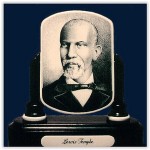(More Information On African Americans)
 Lewis Temple (1800 – 18 May 1854) was an American blacksmith, abolitionist, and inventor. Born in slavery in Richmond, Virginia, he moved to the whaling village of New Bedford, Massachusetts during the 1820s, where he worked as a blacksmith. Later that year he married Mary Clark, with whom he would later have three children. He also opened a whalecraft store although he had no experience with whaling or as a seaman. In 1845, Temple was enjoying so much success that he was able to open a larger whalecraft store.
Lewis Temple (1800 – 18 May 1854) was an American blacksmith, abolitionist, and inventor. Born in slavery in Richmond, Virginia, he moved to the whaling village of New Bedford, Massachusetts during the 1820s, where he worked as a blacksmith. Later that year he married Mary Clark, with whom he would later have three children. He also opened a whalecraft store although he had no experience with whaling or as a seaman. In 1845, Temple was enjoying so much success that he was able to open a larger whalecraft store.
The New England region was the capital of the whaling industry. Whale meat and oil was very valuable and the industry provided jobs to seamen and seafront businesses. A big concern for these people was the inability to develop a surefire method of successfully hunting whales. The existing methods of the day often ended in failure as the whales would disengage themselves from the whalers harpoons by spinning and thrashing about.
In 1848 Temple set out to make an improved harpoon that could withstand the enormous strength of the large mammals and would be difficult to escape from. In 1848 he invented a type of “toggling harpoon” that is sometimes called “Temple’s Toggle”. His harpoon had a pivoting head that stayed embedded within the creature. Calling the invention Temple’s Toggle or Temple’s Iron, the harpoon was actually very similar to hunting tolls used by whale hunters during prehistoric times. His harpoon became a great success, but he never patented it. As such, many blacksmiths began copying the device and selling it as their own. Nonetheless, he enjoyed enough success that he needed to build an even larger shop.
Unfortunately, in 1854 while the new shop was under construction, Temple fell into a hole near the shop and was unable to work. The hole was the result of construction by the city and Temple successfully sued and was awarded $2,000.00 by the court. He never received any of the payment, for he died a few short weeks later as a result of his injuries. All of the profits he had made on his harpoon and his business went to paying for his debts and his family was unable to collect on the money awarded by the court – a strange and ironic tragedy that a man who did so much for the town during his life, would be ignored in death.
Though the City of New Bedford did not recognize their obligation to debt to him at his death, the industry owed him much more because of his invention. Experts after his death agreed with Clifford Ashley, who announced that his Temple’s harpoon was “the single most important invention in the whole history of whaling.”
Click Here For More Information







